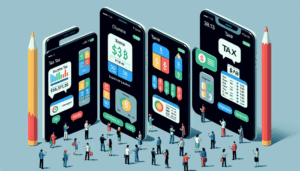
First of all, creating a financial reserve is essential.
So starting an emergency fund may seem like a daunting task, but with a strategic approach, everything can be made easier.
Here are the steps to follow to build a solid financial reserve.
How much you need in your emergency fund is personal and depends on many factors, such as your monthly expenses, lifestyle, family size and so on.
However, a good rule of thumb is to try to save enough to cover three to six months of your essential expenses.
The best way to ensure that you really save money is to make the process automated.
Setting up an automatic monthly transfer to your savings account can be an effective way of ensuring that you are constantly replenishing your emergency fund.
First of all, look at your current expenses and see where you can cut back.
Consider less expensive options or reduce unnecessary spending. This will free up more money that can be channeled into your financial reserve.
Although the idea of an emergency reserve is to have money available immediately in a crisis, this doesn't mean that the money should sit idle in a bank account.
Consider investing part of your reserve in safe, low-risk options that offer a decent return.
First of all, look for ways to increase your source of income.
This could be through an increase in work, doing freelance work, selling items you no longer use, among other options.
The extra money you earn can be put towards your financial reserve.
In the end, the key to building a financial reserve is consistency.
Bear in mind that it will take time, but the peace of mind that comes from knowing you have a financial safety net is irreplaceable.
A financial reserve for emergencies is a security measure that every individual should have in order to protect themselves from unforeseen financial events.
This reserve ensures that you don't find yourself in a difficult financial situation when faced with an unexpected expense.
One emergency reservealso known as an emergency fund, is money that you save specifically for an emergency. unforeseen financial problems.
Such unforeseen events can range from the breakdown of a household appliance, the loss of a job or a delicate health situation that leads to medical expenses.
That's why it's important to have an emergency reserve
Maintaining an emergency reserve can be a challenge, especially if you're not in the habit of saving.
However, with planning, savings automation and conscious use of resources, it is possible to keep a fund for emergencies.
The first step towards good financial management is to build up a solid emergency reserve. And, despite the challenges, it is possible with organization, discipline and the use of the right tools.
Keeping a financial reserve for emergencies is not an easy task, but it is a crucial part of financial planning.
Below are some effective methods for keeping a financial reserve in case of emergencies.
One of the most efficient methods for maintaining a financial reserve is to automate your savings.
This means organizing your finances so that a certain amount is automatically transferred to your savings account as soon as your salary arrives.
This way, you'll be constantly feeding your financial reserve without even thinking about it.
Your financial reserve should be a priority.
One way to ensure that you have enough money to contribute to your reserve is to cut out non-essential expenses.
This can include eating out, magazine subscriptions and spending on luxury items.
Creating a secondary income, whether through a side job, an entrepreneurial venture or investments, is an effective way of contributing to your financial reserve.
Notably, this secondary income should be used primarily for saving, not for daily expenses.
Regularly reviewing your financial reserve is important to ensure that it is growing at a healthy rate.
In addition, this can help you identify if there are areas where you can save more or if you need to adjust your spending.
We emphasize the importance of using budgeting and financial planning tools to help manage your finances and maintain the regularity of your emergency reserve.
In short, maintaining an emergency financial reserve requires discipline, planning and a commitment to long-term financial health.
By following the above methods, you can ensure that you are prepared for any financial emergency that may occur.
We recommend using online tools such as Mint e You Need a Budget (YNAB) to help you manage and monitor your savings progress.
Some well-regarded applications in this field are Mint, You Need a Budget, e Personal Capital.
For more information see the websites: APPLICATION1, APPLICATION2